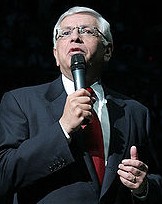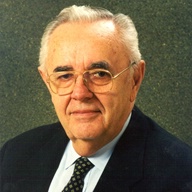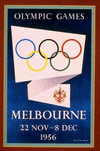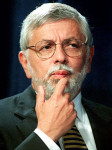 For David Stern, the Olympic experience has come full circle.
For David Stern, the Olympic experience has come full circle.
The NBA commissioner has often found himself depicted as an international bully, and nothing could be further from the truth – at least as it applies to past Olympics.
The oddity of such a charge is that it occurs only in this country, which leads us to one of the great mysteries of American sports journalism: How is it that so many journalists throughout the world know exactly what happened, yet accomplished reporters in the U.S. continually either misrepresent or misunderstand the way NBA players became eligible for the Olympics?
With the basketball world commemorating the 20th anniversary of the Dream Team this summer, the process of how NBA players were invited into international play has been revisited in various forums, and it is simply amazing how often it is incorrect.
In the second installment of our summer series celebrating the Dream Team, we will again try and set the record straight with 20 facts.
Part 1 of the series was the Isiah Thomas Exclusion.
Part 2 is the NBA Inclusion.
1. Start with a simple point, but apparently one that is very difficult for the American mind to comprehend. Let me make this perfectly clear: THE 1988 LOSS BY THE UNITED STATES TO THE SOVIET UNION IN SEOUL, SOUTH KOREA, HAD ABSOLUTELY NOTHING TO DO WITH NBA PLAYERS BEING IN THE OLYMPICS. ZERO.
2. Basketball is like all Olympics sports. It is controlled internationally by an organization that establishes rules including those governing participation. In basketball, that organization is the Fédération Internationale de Basketball, which translated is the International Basketball Federation. The acronym is FIBA. The NBA has no more power in FIBA than FIBA has in the NBA.
3. Until 1989, the representative of FIBA and governing body of Olympic basketball in this country was the Amateur Basketball Association of the United States of America (ABAUSA). It included several amateur organizations such as the AAU, high schools and junior colleges. But it was run primarily by colleges. The NBA was not a member of ABAUSA. Later, that organization became USA Basketball, and the NBA joined it in the fall of 1989.
4. A few months earlier, ABAUSA representatives went to Munich for the vote on allowing NBA players to play in the Olympics. That measure passed in April 1989 by a count of 56-13. One of those 13 “no” votes was cast by the ABAUSA. To make sure there is no misunderstanding, let me state it again a little more forcefully: THE UNITED STATES VOTED AGAINST INCLUDING NBA PLAYERS IN THE OLYMPICS.
5. The first tournament where NBA players were allowed to compete was the 1990 World Championships in Argentina. USA Basketball, however, chose to continue using college players and sent a team that included Alonzo Mourning, Christian Laettner, Billy Owens and Kenny Anderson. That team lost to a Yugoslavian team led by NBA players Drazen Petrovic and Vlade Divac in the semifinals. Yugoslavia went on to win the gold medal.
 6. The man responsible for NBA players playing in international tournaments is Boris Stankovic, who was Secretary-General of FIBA for 26 years and currently serves in an emeritus role. Stankovic was born in Serbia and was a player, coach and administrator before becoming the head of FIBA. Stankovic long thought the ban on NBA players was, to use his words, “dishonest” and “immoral” because professionals from other countries were allowed to play. In 1988, Brazil’s Oscar Schmidt was making a salary in excess of $500,000 playing in Italy but was technically an amateur. Only NBA players were classified as professionals.
6. The man responsible for NBA players playing in international tournaments is Boris Stankovic, who was Secretary-General of FIBA for 26 years and currently serves in an emeritus role. Stankovic was born in Serbia and was a player, coach and administrator before becoming the head of FIBA. Stankovic long thought the ban on NBA players was, to use his words, “dishonest” and “immoral” because professionals from other countries were allowed to play. In 1988, Brazil’s Oscar Schmidt was making a salary in excess of $500,000 playing in Italy but was technically an amateur. Only NBA players were classified as professionals.
7. A fact that is not widely known is that at the 1986 FIBA convention, Stankovic introduced a resolution to allow NBA players in the Olympics and brought it to the floor for a vote. Stankovic said it narrowly failed 31-27 but that “18 or 19 countries abstained.” Stankovic was irritated because those abstentions could have made a difference and NBA players would have been eligible for the 1988 Olympics in Seoul.
8. Here’s the myth: The U.S. lost in Seoul so the NBA made a unilateral decision to send the Dream Team to the 1992 Olympics and carpet bomb the rest of the world.
9. Here’s what really happened: The U.S. lost in Seoul so FIBA made the decision to invite NBA players because their member countries got no thrill out of beating U.S. collegians. If the Olympics are about being the best in the world, the only way to be the best is to beat the best. I wrote a magazine article on the issue in 1996 and USA Basketball still has it on its web site.
10. Americans have a very difficult time understanding why anyone would react to a huge victory by changing a rule that would ensure embarrassing losses. Stankovic explained with a track analogy: “If you have a chance to run a sprint against Carl Lewis, you know you’re going to lose. But you still want to run the race.”
11. Dave Gavitt, who was president of USA Basketball at the time put it this way: “Europeans look upon decades and lot different than we do. If we beat them up badly for 20 years, they’re willing to take the beating and at the end of the 20 years, they feel they will be there.”
 12. History lesson I. One of the greatest U.S. Olympic teams in history was anchored by Bill Russell in 1956. That team was more dominant than the Dream Team. It won the gold medal and defeated opponents by an average of 53.2 points a game. That was followed by dwindling margins in 1960 (41.8), 1964 (30.0) and 1968 (26.0). The U.S. then lost to the Soviet Union in the controversial 1972 game, but even though that victory was tainted, the point is the Soviets had caught up.
12. History lesson I. One of the greatest U.S. Olympic teams in history was anchored by Bill Russell in 1956. That team was more dominant than the Dream Team. It won the gold medal and defeated opponents by an average of 53.2 points a game. That was followed by dwindling margins in 1960 (41.8), 1964 (30.0) and 1968 (26.0). The U.S. then lost to the Soviet Union in the controversial 1972 game, but even though that victory was tainted, the point is the Soviets had caught up.
13. History lesson II. In 1992, the Dream Team won the gold medal with an average margin of victory of 43.8. That was followed by U.S. teams in 1996 (31.8) and 2000 (21.7).
14. Want to know how a basketball visionary thinks? This is what Boris Stankovic told me in a 1991 interview: “I believe strongly that only playing the best allows you to get better. We will have the same situation we have had before [with the U.S. dominating at first]. My position is that in 10 to 15 years, the other countries will catch up. I’m hoping one of our teams can win a gold medal by 2004.”
15. In the 2004 Olympics, the U.S. lost to Puerto Rico, Lithuania and Argentina and settled for a bronze medal. Argentina won the gold. Stankovic was dead on.
16. Actually, he was two years late. In the 2002 World Championships, which are insignificant in this country, the U.S. with NBA players such as Paul Pierce, Reggie Miller, Baron Davis and Shawn Marion lost three games and finished sixth. And the tournament was in Indianapolis.
17. Besides the obvious journalism goal of accuracy, why is it so important to get it right? Because it is more important to give proper credit to Boris Stankovic for doing something brilliant rather than inaccurately blaming the NBA for doing something ugly.
18. Jack McCallum, the longtime writer for Sports Illustrated, was one of about eight members of the media who covered the Dream Team from start to finish. He has written a book on the 20-year anniversary and his first chapter is about Stankovic’s background and how he changed the world of basketball. As always, McCallum got it right. So did the recent documentary of the Dream Team on NBA-TV.
19. Twenty years later, however, after all those accusations that he acted like an ugly American in 1992, David Stern has anointed himself international czar and wants to limit Olympic participation to players 23 and younger. Stern’s history suggests the move is a simple one – he’s found a way to make more money than the NBA currently makes from having its players in the Olympics. The NBA is fond of telling us it has 78 international players from 39 countries on its rosters. It is overpoweringly arrogant to tell players 24 and older they can no longer represent any of those countries at the Olympics.
 20. So isn’t it ironic that on the 20th anniversary of perhaps the most amazing team phenomenon in sports history, the man who has been wrongly accused of being a bully for the last 20 years now is acting like one?
20. So isn’t it ironic that on the 20th anniversary of perhaps the most amazing team phenomenon in sports history, the man who has been wrongly accused of being a bully for the last 20 years now is acting like one?
RELATED CONTENT: Stern want to ruin the Olympics – Part II.
RELATED CONTENT: Stern wants to ruin the Olympics.
Jan Hubbard has written about basketball since 1976 and worked in the NBA league office for eight years in between media stints. Follow him on Twitter at @whyhub.
Stern isn’t ruining the Olympics, he is making the World Cup of Basketball a more significant event. It will also allow more players to represent their countries and help talent develop.
Very interesting. Thanks for the article, I learned something!